Halcyon Days in the Dream City
by Mrs. D. C. Taylor
Continued from Part 11

The Infanta of Spain was entertained by the World’s Fair officials to-day, June 8, 1893, and we were fortunate in viewing the pageant from a good stand point.[1]
It was a perfect day, cool and bright, and smiled on unclouded to its close. We secured some of the handy little camp chairs that are rented on the ground, and entering the south door of the Mining building wound our way up the long stairway to the balcony, overlooking the doorway of the Administration building, that was to have the honor of receiving the Infanta of Spain.
The ground was covered with a moving mass of people shifting and swaying like the waves of the sea. The doors of the Administration building were closed to all but invited guests, and the people stood about them, and peeped into the windows, as people always will, if they are refused entrance to any place whatever.
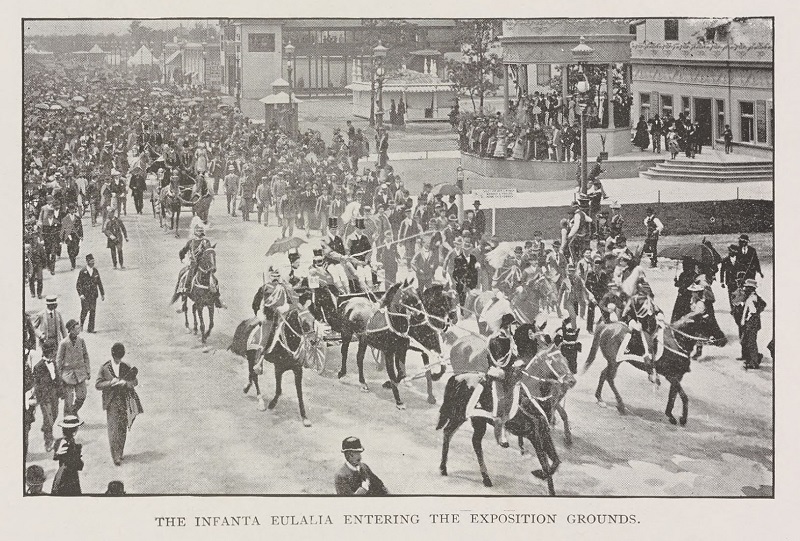
The Infanta entering the exposition grounds on the Midway for “Princess Eulalia Day” at the 1893 World’s Fair. [Image from The Graphic History of the Fair. Graphic Co., 1894.]
Then came a pair of cavalrymen in black, mounted on black steeds, and wearing on their heads black hussar caps with long yellow plumes; following them a company of cadets in white trousers and gray coats marching with such precision and uniformity that their shining black shoes all flashed back the sunlight at exactly the same angle and the same instant of time. Two and two, they came, then wheeled into columns of eight with the same instantaneous precision and regularity, on into the hollow square formed by the guards. Following them a company of black hussars like the first, excepting that their streaming plumes were snowy white, two by two and then wheeling out into columns of eight like the cadets, with the same machine like precision.[3]
Then two little, brown, bare-legged, Egyptian footmen dressed in full snow white garments, trotting by the bridle reins of the leaders of four magnificent bang-tailed horses drawing a large barouche, and in the barouche, a sweet little, fair, gentle, delicate-looking lady gowned in some pale summer fabric, crowned with a tiny bonnet trimmed with bright rose-pink flowers, and carrying a costly black lace parasol that shaded her face more than was quite satisfactory to the multitude. There were some men in the barouche, one of them, even, a prince, but we did not see them, insignificant creatures, who wanted to look at them when that gay little human flower was blooming beside them?
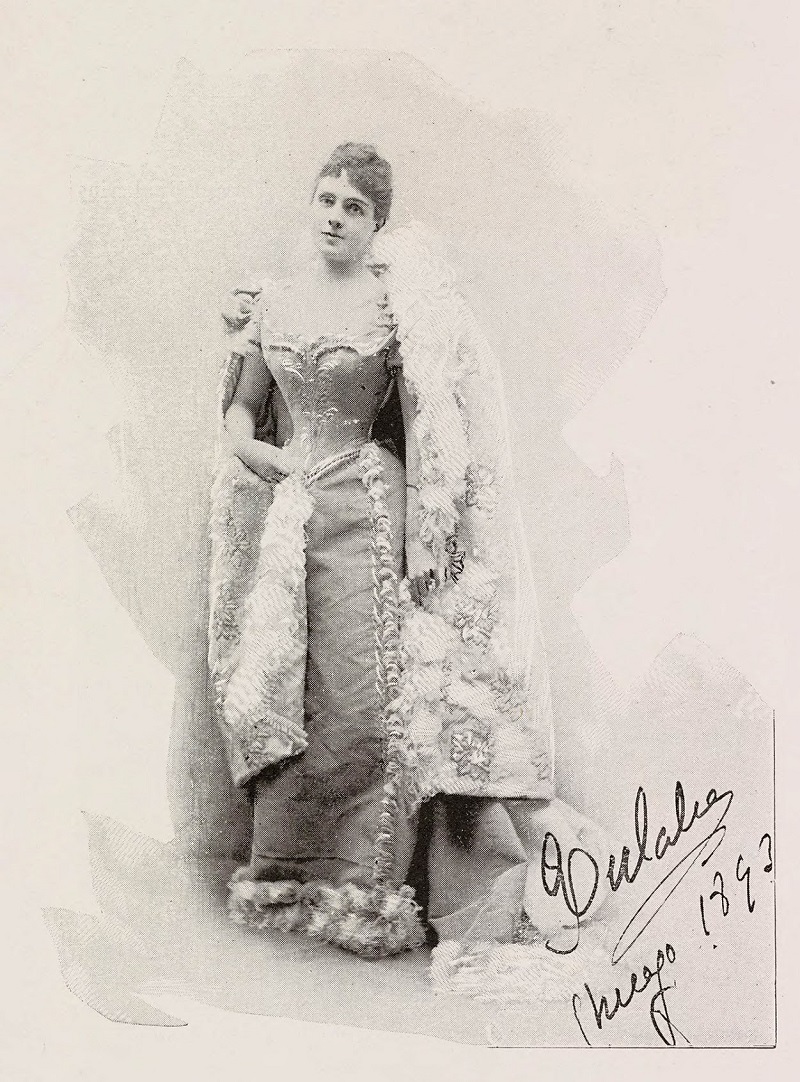
The Infanta Eulalia. [Image from The Graphic History of the Fair. Graphic Co., 1894.]
How those manly hearts swelled beneath those tightly buttoned gray coats of the cadets; with what a vim and flash the guns rose to their shoulders as by one impulse, with what a resounding simultaneous clang the butts struck the ground, the white trousers wheeled and marched and counter marched in victorious pride before those bright and smiling eyes; and then the hussars had their innings. What a vision of flowing manes and tails and prancing steeds! What an array of broad square shoulders and manly faces under the warlike black caps, and long ranks of white plumes, streaming and tossing, as they too, wheeled and marched and counter marched, each man erect and motionless in his saddle while his horse seemed to obey the impulse of his rider’s will, for there was no visible sign of other guidance!
It was a pretty sight, and when the little lady reluctantly descended and the great doors swallowed her up and hid her from view, cadets and hussars, marched and trotted out of sight, and we turned and went our way again, satisfied that our hours of waiting had been amply repaid. May the royal lady reach her own sunny shores in safety, and we are sure she will never forget the bright June day, when a foreign land and people strove to give her all the homage they could offer, in the city by the great Western sea.
Continued in Part 13
NOTES
[1] The Spanish Princess Eulalia, the youngest daughter of Queen Isabella II, was appointed by Queen Regent Maria Cristina as a royal representative of Spain to the Columbian Exposition. The Infanta spent nineteen days being entertained in Washington D.C. and New York before arriving in Chicago on June 6. Eulalia was the guest of honor at the Fair for “Princess Day” on June 8, when attendance swelled to 168,996, the largest attendance to date.
[2] The Saragossa Military Band accompanied the Infanta on much her trip around America.
[3] Included in the procession through the Midway to the Administration building were 130 members of the Michigan Military Academy in Orchard Lake, Michigan, and the Chicago Hussars.
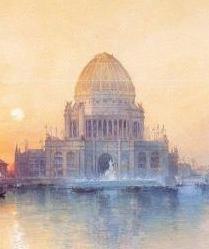
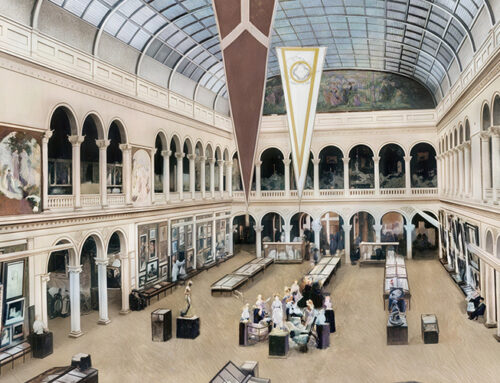
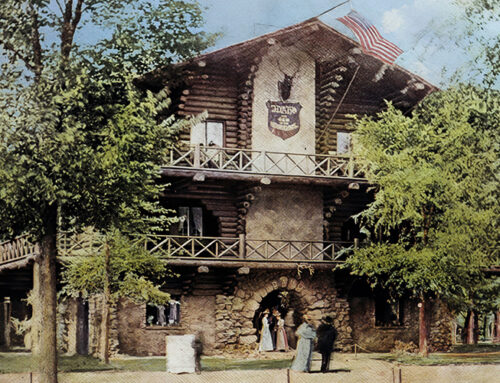
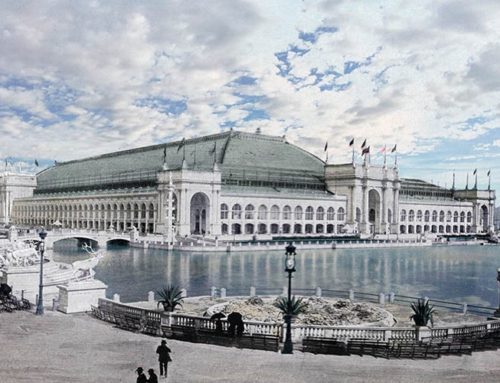
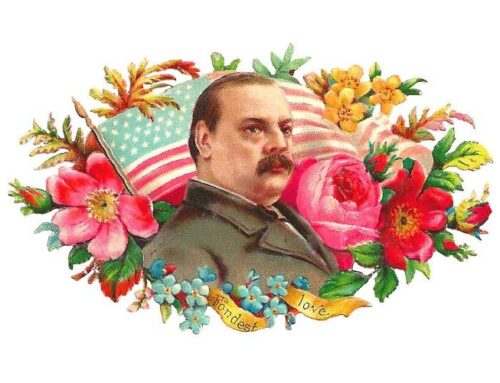
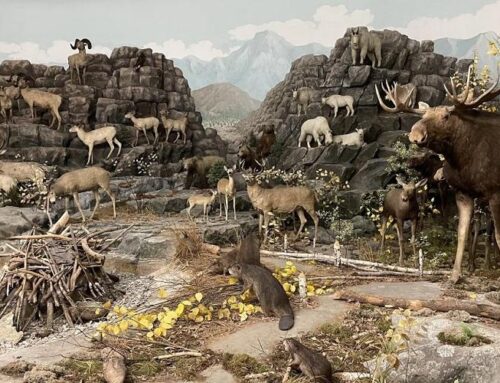
Leave A Comment